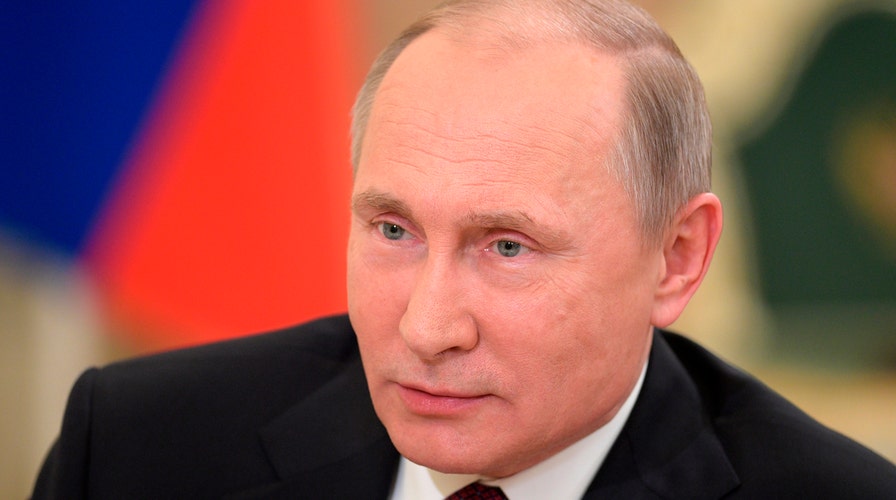Media in panic mode over CIA's Russia assessment
Howard Kurtz breaks down coverage of hacking controversy
In baseball, they call it “a case of the yips.”
Mackey Sasser was a journeyman Major League catcher for eight years, toiling for the Giants, Pirates, Mets, Mariners and again the Pirates.
Catching wasn’t Sasser’s problem.
But throwing sure was.
As in throwing the ball back from behind home plate to the pitcher.
Something crawled inside the head of Sasser, compelling him to double-clutch every time he went to return the ball to his battery-mate.
This is a problem, because catchers are required to successfully perform this seemingly menial feat dozens upon dozens of times each game.
Teams in all sports haul in psychologists to work with players who suddenly develop the yips. Sometimes, teams tinker with the psychology of their adversaries. Such was the case two seasons ago when the Washington Nationals spun everything from George Michael to The Carpenters over the stadium PA while the visiting New York Mets took batting practice.
This is PSYOPS in sports. Anything to shake up the concentration of the other team to eke out just the smallest advantage – which could result in victory.
But what do you do when an entire nation comes down with a case of the yips? Yep. That might be where we are.
Allegations now race through Washington that Russia somehow interfered with the election. The CIA contends that Moscow executed cyber attacks to bolster the chances of President-elect Trump. But the Office of the Director of National Intelligence (ODNI), which oversees the CIA and 16 other U.S. spy agencies, isn’t saying that’s precisely what happened.
It’s clear someone hacked the Democratic National Committee (DNC). The RNC? There’s a denial there. What role did WikiLeaks play in all of this? Is this sour grapes from Democrats? Did Trump’s ties with Russia have anything to do with it?
In a letter Monday, House Intelligence Committee Chairman Devin Nunes, R-Calif., told ODNI Director James Clapper he was “dismayed” that no one in the intelligence community bothered to tell Congress about fissures among the agencies as to whether the Russians were involved in the election.
House Minority Leader Nancy Pelosi, D-Calif., called for an independent, 9/11 Commission-style panel to probe what happened
“Regardless of the outcome of the election, the American people deserve to know the truth and a commitment to protect our democracy from foreign meddling,” said Pelosi.
Sen. John McCain, R-Ariz., took the CIA charge about Moscow with a grain of salt.
“The CIA has not always been right, to say the least,” said McCain late last week.
McCain did not mention a failure by the U.S. to locate weapons of mass destruction in Iraq, nor a prodigious breakdown when the intelligence community failed to forecast the breakup of Eastern Europe and the end of the Cold War.
Trump then ripped the CIA over its Russia analysis. Rep. Adam Schiff, D-Calif., the top Democrat on the House Intelligence Committee, suggested that the president-elect head to the CIA’s headquarters in Langley to view the 117 stars affixed to the lobby wall. The stars represent clandestine, fallen officers who gave their lives in the service of the U.S. Schiff thought that Trump “reflect on his disparagement of the intelligence community.”
At a congressional hearing in mid-November, Clapper told lawmakers that Russian cyber warfare “seemed to have curtailed” after the election. But then came word that officials had proof of Russian interference.
That prompted Nunes to summon intelligence community briefers and some of his committee members to Capitol Hill for a closed-door session today. But the intelligence services rebuffed the request, infuriating the chairman.
This sent lawmakers reeling as narratives about alleged Russian tampering in the electoral process gurgled.
Some Republicans accused Democrats of simply planting a false flag due to the election outcome. Rep. Don Beyer, D-Va., argued that members of the Electoral College “should be given all information relevant to this interference before they make their decisions.” Beyer suggested a delay in the Electoral College vote scheduled for next week.
So what exactly is going on? No one really knows. But everyone is freaked and no one has the answers.
In the intelligence community, this is the quintessence of PSYOPS, a form of political warfare designed to contour the behavior of a rival.
No one can publicly tell anyone directly what Russia may or may not have done. But this “Russian” phenomenon has now crept into the heads of many Americans. The intelligence community is divided. The president-elect is saying one thing. Lawmakers on Capitol Hill demand information. And the public? Well, it resides somewhere in Comet Ping Pong land, struggling to know what’s real and what’s fake.
If this were baseball, we’d call it a case of the yips. Can’t throw back to the catcher. Firing balls into the dugout. Everything in the head is all bonkers.
Any possible impact Russia may have had on U.S. elections is what film director Alfred Hitchcock would characterize as a “MacGuffin.” A MacGuffin is a theatrical device which propels the protagonist into action and advances the plot.
MacGuffins themselves typically diminish in importance as movies progress. The ring in “Lord of the Rings.” The sled Rosebud in “Citizen Kane.” Everyone is searching for the MacGuffin, driving heroes and villains deeper into conflict.
Emotions are shot. People are dividing into camps as to who is to blame, how Congress should investigate and what members of the Electoral College should do.
Maybe nothing happened and this is all a very successful PSYOPS maneuver.
And everyone has a case of the yips.
Capitol Attitude is a weekly column written by members of the Fox News Capitol Hill team. Their articles take you inside the halls of Congress, and cover the spectrum of policy issues being introduced, debated and voted on there.





